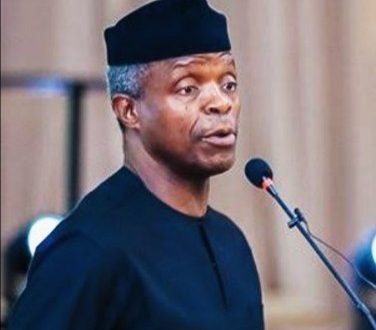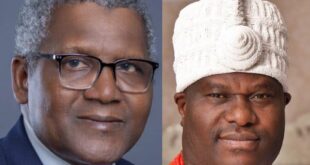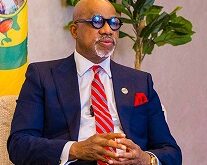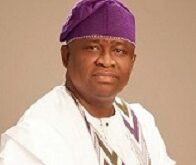By AbuSatar Hamed
LAGOS: The Vice President Yemi Osinbajo (SAN), has said that Nigeria can become a stronger and more prosperous nation if states have more powers.
According to a release signed and made available to StarTrend Int’l magazine & www.star trendinternational.com by Laolu Akande, Senior Special Assistant to the President on Media & Publicity, Office of the Vice President, Prof. Osinbajo stated this while speaking at the 59th Independence Anniversary Lecture at the Island Club, Lagos, on Friday, October 4, 2019.
The Vice President, who titled his lecture, “The Whole Is Only As Great As The Sum Of Its Parts,” said Nigeria’s population and diverse ethnic groups has necessitated that states in the country be strengthened to enable them contribute more to national productivity and development.
Prof. Osinbajo stated that this can be achieved with “stronger, more autonomous States that are able to generate and control more of their resources.”
According to the Vice President, the current administration of President Muhammadu Buhari is ensuring that states collaborate more with the Federal Government on different initiatives to improve visionary governance in the country.
“The most important transformative change we can make in Nigeria is to lift the majority of our people out of deprivation by speedily creating wealth and opportunity leading to the eradication of poverty,” he said.
He further said that “The nation cannot be wealthy when its component parts – the states – are poor. The standard of living of the federation depends on the standard of living of people who live in the states. In other words, the federation can only be as rich as its richest state and as strong as its strongest state. Our national indices merely aggregate the realities of our weaknesses and strengths as present in all our constituent units. Consequently, we can only build a stronger and more prosperous nation by building stronger and more prosperous states.”
He said, “Building stronger states means ensuring the devolution of more power to the states, enabling them to control more of their resources and make more of their own administrative decisions such as the creation of Local Governments, the establishment of state and community police forces as well as state correctional facilities; creation of special courts and tribunals of equivalent jurisdiction to high courts. The point I am making is that states must have more powers and more rights.”
The Vice President stated that, “The challenges confronting us now are about strengthening internal coherence and cohesion. It is about moving from affirmations of unity to the achievement of synergy in which the sum of our strengths exceeds the totality of our constituent parts.”
He noted that, “Opportunities for smart and visionary governance abound. So, for example, while states may not be able to right now establish their police forces, they can collaborate with the federal government on initiatives such as community policing which also revolves around the idea of localized law enforcement. Our administration is currently pursuing this option. When we set our minds to solving problems, we will find that what is truly possible is not as distant from the ideal that we seek.”
The Vice President further noted that Nigerians, despite differences, must draw inspiration from its history of a common shared belief, in order to attain the quest for collective progress and continued unity.
He said, “In order to do so, we must draw inspiration from the deep wells of our history. The founding fathers of our republic – Nnamdi Azikiwe, Obafemi Awolowo and Ahmadu Bello. These three differed on many things but shared a clear belief in the Nigeria’s boundless capacity as a united country. Regardless of their keen rivalry, they agreed on the crucial necessity of Nigeria staying united despite the many centrifugal pressures that buffeted the young nation. On this matter of unity, their differences were those of degree rather than category.
“Each of them occupied different niches on the spectrum of national integration but they all shared the view that the ideal situation was one in which a united and prosperous Nigeria took its rightful place in the world as the most populous black nation on Earth and as the foremost black power.
“From the foregoing, it is clear that the founding fathers were of one mind as far as Nigeria’s world historic significance was concerned. They also recognized that her ability to fulfil her destiny was dependent on her continued unity.”
The Vice President added that, “The point of this excursion into history is to show that strong sub nationals led by visionary leadership is what it takes to develop the Nation. What we require today is stronger, more autonomous States able to generate and control more of their resources and visionary leadership.”
Speaking during a Q&A session, Prof. Osinbajo added that the Buhari administration will continue its fight against corruption.
“Two governors have been convicted for corruption, and they are in jail today. It took almost 10 years because our legal system is extremely slow, but we achieved it,” he said.
“The other thing I think we have to take note of is the fact that corruption fights back, and we also as citizens have to much more up and doing, because corruption fights back. They throw mud at everybody, give the impression that, “everybody is corrupt.”
“If we don’t control corruption, it’s the worst possible cancer that any nation can have, and as we can see from anything else, it just destroys a country by installments.”
Prof. Osinbajo stated that he will continue to give his best in service to the country under the Buhari administration.
“I intend to do everything that is necessary, everything that I can to ensure that we achieve the promises that we made and to ensure that we achieve the kind of country that we want to achieve. And I will do that every day, every minute, for as long and God gives me life and opportunity,” he said.
 Startrend International Magazine For Your Latest News And Entertainment Gists
Startrend International Magazine For Your Latest News And Entertainment Gists





